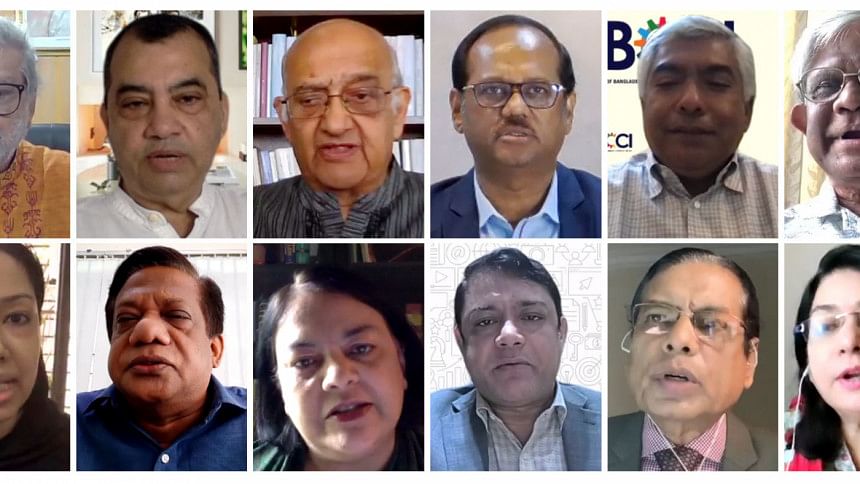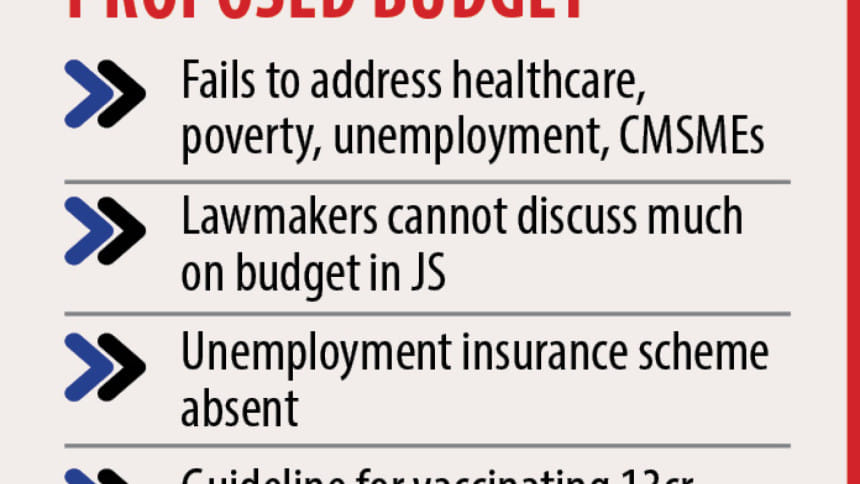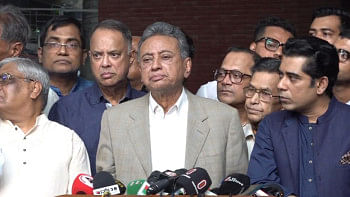Budget for 2021-22: Pressing issues left unaddressed


The proposed budget for the fiscal year 2021-22 has failed to address pressing issues related to healthcare, poverty, unemployment, and CMSMEs even though they required special attention to protect lives and livelihoods amid the pandemic.
The needs of the poor and the marginalised have also been ignored in the budget, experts and speakers at a webinar also said.
They made the comments while speaking at a virtual budget dialogue organised by private think-tank Centre for Policy Dialogue (CPD) yesterday. Two lawmakers, including a minister, business chamber leaders, government high-ups and labour leaders, among others, participated in the webinar, moderated by CPD Distinguished Fellow Mustafizur Rahman.
Despite the pandemic, allocation for the healthcare sector did not go up for the coming fiscal year compared to the average growth of the allotment in previous years.
The total budget allocation for the sector has been proposed to be increased by 12 percent from Tk 29,247 crore in 2020-21 to Tk 32,731 crore in 2021-22, which is lower than the 14 percent average annual increase in the total budget allocation for healthcare between 2010-11 and 2021-22. It is only 0.9 percent of the GDP.
In its presentation at the programme, the CPD said how the allocation was increased indicated that the raise was business as usual and it was nothing out of the ordinary. It happened despite the fact that the healthcare sector was reeling from the Covid shock.
Saber Hossain Chowdhury, chairman of the Parliamentary Standing Committee on the Ministry of Environment, Forest and Climate Change, said, "Ignoring public health, we will not be able to become a developed nation. If people of the country survive, the economy will grow a lot in future.
"We go to parliament only to say yes or no. In fact, we cannot discuss a lot there on the budget."
Speaking on those who have been pushed below the poverty line by the pandemic, Saber said the Bangladesh Bureau of Statistics (BBS) and the Bangladesh Institute of Development Studies (BIDS) should come up with the exact number of poor and new poor as there are gaps on different estimates on the numbers.
Responding to reporters' queries last week, Finance Minister AHM Mustafa Kamal said he did not agree regarding the data regarding the new poor. He made the comment after several research organisations found through surveys that the country's poverty rate jumped to 42 percent from 20.5 percent in the pre-pandemic period.
CPD Chairman Rehman Sobhan said the US, which was grappling with the highest rates of Covid infection, has now been reporting the lowest rates because it vaccinated its people.
He also suggested the government create an unemployment insurance scheme for garment workers in collaboration with the Bangladesh Garment Manufacturers and Exporters Association (BGMEA) to help them survive.
Besides, the CPD chairman suggested the government come up with some programmes to provide employment opportunities to people. He also said measures should be taken so that the Cottage, Micro, Small and Medium Enterprises (CMSMEs) can create such opportunities.
Nihad Kabir, president of Metropolitan Chamber of Commerce and Industry (MCCI), suggested gradually lowering the corporate tax to help attract investment and creating employment.
She said the financial support for the CMSMEs did not reach the beneficiaries properly. "Here only the financial support is not enough, policy support from the government is also required."
Speaking on Covid-19 vaccination, she said it would take four years to inoculate all people in the country if the vaccination progressed at the current pace. "The vaccination rate should be expedited."
Md Jashim Uddin, president of the Federation of Bangladesh Chambers of Commerce and Industry (FBCCI), said, "If the government gives the CMSMEs a special fund, they can provide employment."
The FBCCI chief also said the repayment period for loans from the stimulus funds for the CMSMEs should be extended to December 31 from June 31 as businesses were struggling amid the pandemic.
Salehuddin Ahmed, former governor of Bangladesh Bank, said the proposed budget ignored the needs of the poor and the marginalised.
He also suggested a reform in the banking sector, stock markets and Bangladesh Energy Regulations Commission.
Rumeen Farhana, a lawmaker from the BNP, said the lives and livelihoods of people were under threat because of the Covid-19 fallouts.
The healthcare sector has been ignored in the budget. The spending of 72 percent of the budget allocation even in the Covid-19 time indicates that a massive reform is needed in the healthcare sector, she said.
She also said although it would take four years to vaccinate 13 crore people, the proposed budget did not provide any guideline on how the people would be vaccinated.
The government's allocation for the social safety net is also minimal. Many would be left out of the support, she added.
Kalpona Akter, executive director of the Bangladesh Centre for Worker Solidarity (BCWS), said some three lakh workers lost their jobs during the pandemic, but the government did not have any allocation for them.
Also the workers in the agricultural sector did not get any allocation in the budget, she said. So, the government should bring them under the proposed unemployment insurance scheme.
Shahidullah Azim, vice-president of the BGMEA, demanded 10 percent cash incentive on export of garments made from man-made fibre so that new investment came in this potential sector.
Mirza Nurul Ghani Shovon, president, Central Executive Committee of the National Association of Small and Cottage Industries of Bangladesh (NASCIB), said the actual disbursement of the Tk 23,000 crore fund for the CMSMEs is 25 percent although some quarters have been saying it is 72 percent.
While she was presenting the keynote paper Fahmida Khatun, executive director of CPD, said the target of revenue collection and expenditure in the budget might be very difficult for the government to achieve.
While addressing the dialogue, Planning Minister MA Mannan said the BBS would start working on the new poor soon.
He said the government had been discussing launching a universal pension scheme. Mannan said he faced many difficulties when he took the task of reforming the Implementation, Monitoring, Evaluation Division (IMED) under the planning ministry for more transparency in government spending.
He also said VAT was supposed to be a good source for revenue generation, but the VAT system is not working properly.

 For all latest news, follow The Daily Star's Google News channel.
For all latest news, follow The Daily Star's Google News channel. 



Comments